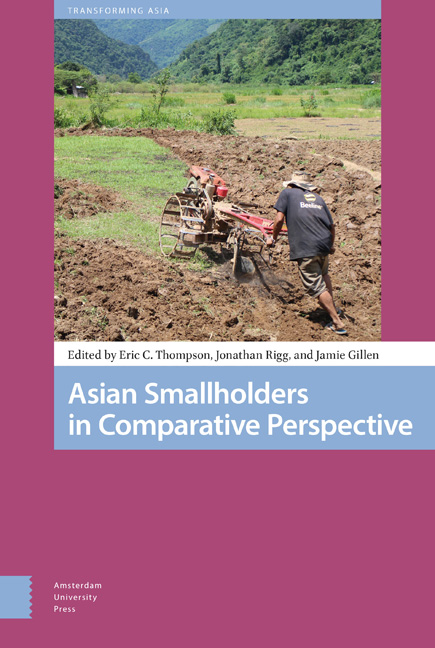Book contents
- Frontmatter
- Contents
- List of Maps, Figures and Tables
- Preface
- Introduction: Asian Smallholders in Comparative Perspective
- 1 Cambodia: Political Strife and Problematic Land Tenure
- 2 Indonesia: Whither Involution, Demographics, and Development?
- 3 Japan: Government Interventions and Part-time Family Farming
- 4 Laos: Responding to Pressures and Opportunities
- 5 Malaysia: The State of/in Village Agriculture
- 6 The Philippines: Fragmented Agriculture , Aquaculture, and Vulnerable Livelihoods
- 7 Singapore: Making Space for Farming
- 8 Taiwan: Toward the Revitalization of Smallholder Agriculture
- 9 Thailand: The Political Economy of Post-Peasant Agriculture
- 10 Vietnam: From Socialist Transformation to Reform
- Index
9 - Thailand: The Political Economy of Post-Peasant Agriculture
Published online by Cambridge University Press: 21 November 2020
- Frontmatter
- Contents
- List of Maps, Figures and Tables
- Preface
- Introduction: Asian Smallholders in Comparative Perspective
- 1 Cambodia: Political Strife and Problematic Land Tenure
- 2 Indonesia: Whither Involution, Demographics, and Development?
- 3 Japan: Government Interventions and Part-time Family Farming
- 4 Laos: Responding to Pressures and Opportunities
- 5 Malaysia: The State of/in Village Agriculture
- 6 The Philippines: Fragmented Agriculture , Aquaculture, and Vulnerable Livelihoods
- 7 Singapore: Making Space for Farming
- 8 Taiwan: Toward the Revitalization of Smallholder Agriculture
- 9 Thailand: The Political Economy of Post-Peasant Agriculture
- 10 Vietnam: From Socialist Transformation to Reform
- Index
Summary
Abstract
The situation of smallholders in Thailand presents a number of puzzles. Agriculture has long been commercialized, yet the pattern of landholding remains based on the smallholding. Agriculture has declined as a proportion of GDP and young people have been moving out of agriculture, yet the number of farming households has not declined accordingly. The answer to these puzzles lies partly in the diversity, complexity, and mobility of households and their multiple occupations, and partly in policies of the Thai state and strategies of agribusiness. The place of rural people in the country's social and political life has changed with growing interaction between city and countryside. Yet, there remain significant cultural gaps between city dwellers’ expectations and rural people's aspirations.
Keywords: agrarian change, rural, smallholders, Thailand, transformation
Thailand is a country that has, in many ways, followed a seemingly conventional developmental trajectory as agriculture has progressively commercialized away from its earlier subsistence-oriented role, and has reduced in its significance compared to other economic sectors. Yet, farming in Thailand remains primarily comprised of smallholders, with there being only a relatively limited number of large agricultural properties in the country.
A further part of the puzzle is that, with the apparent persistence of smallholder farming, there is actually a high level of economic inequality. Private land ownership has one of the highest Gini coefficients in Southeast Asia. In Thailand, the relatively large number of people who still identify as farmers contrasts with the small economic contribution of the agricultural sector, suggesting a big gap in productivity and income between smallholderbased agriculture and the manufacturing and service sectors.
Further, there are great discrepancies between the realities of smallholder farming and the perceptions of urban elites and policymakers who set or constrain the conditions of rural advancement. With this in mind, it is important to understand not only the material conditions of smallholding in Thailand, but also its cultural and political meanings.
This chapter aims to examine the situation of smallholders in Thailand with an eye towards unravelling, if not completely solving, some of these puzzles. In addition, it provides the basis for anticipating the future pathways for smallholders in Thailand's rapidly changing economy and society.
- Type
- Chapter
- Information
- Asian Smallholders in Comparative Perspective , pp. 271 - 306Publisher: Amsterdam University PressPrint publication year: 2019



